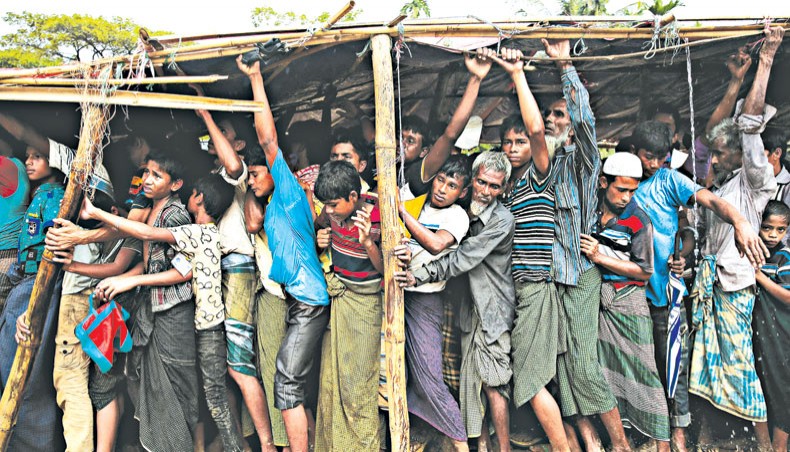ROHINGYA CRISIS Repatriation deal set to face hiccups
Implementation of a deal on starting repatriation of forcibly displaced minority Rohingyas to their home is likely to face hiccups as the Bangladesh and the Myanmar governments are set to miss the deadline for establishing a joint working group and a terms-of-reference for supervising return to Rakhine State.
‘We cannot go for implementation of the “arrangement” signed for starting repatriation without formation of a joint working group and agreeing terms-of-reference to make it operational,’ a senior
Bangladesh diplomat told New Age on Monday, when exodus from Rakhine State continued for about 16 weeks.
Formation of the JWG and agreeing terms-of-reference to make the JWG operational was scheduled to be completed by December 14, but ‘we may need several more days’, said another diplomat.
The two governments had formally committed to establishing the JWG and agreeing terms-of-reference of the group to oversee all aspects of return ‘within 3 weeks of signing’ an arrangement by the two countries, according to Article C(11) of the Arrangement on Return of Displaced Persons From Rakhine State signed on November 23.
Bangladesh has proposed to form a secretary-level JWG on November 2 and the two sides were exchanging letters till Monday.
The TOR is expected to be finalised incorporating the jurisdiction and mandate of the JWG and provisions how it will function.
Bangladesh proposed a draft of the TOR on November 14 and Myanmar replied on December 4. Bangladesh proposed an updated TOR on December 10.
Bangladesh wants sustainable repatriation of Rohingyas while Myanmar wants only return, says an official.
‘Myanmar is trying to narrow the scopes of return,’ said a diplomat.
United Nations High Commissioner for Refugees deputy high commissioner Kelly Clements said on December 7 that present conditions in Myanmar’s Rakhine State were not in a place to enable safe and sustainable return of the Rohingyas to their homeland.
‘At present, conditions in Myanmar’s Rakhine State are not in place to enable safe and sustainable returns,’ said Kelly at a press conference in Dhaka.
The process of return must meet the international refugee and human rights standards, she said.
Foreign minister AH Mahmood Ali and Burmese minister at the state counsellor’s office Kyaw Tint Swe signed the instrument on behalf of the respective government in Nay Pyi Taw, the administrative capita of Myanmar.
The two sides also agreed on signing a specific bilateral instrument in ‘a speedy manner’ on physical arrangement for repatriation, which includes developing mechanism for verification of Rohingyas who crossed over to Bangladesh from Myanmar, setting a time schedule, transport and logistics, reception procedure and communication system between both sides.
Both sides also agreed that the process of return commenced within two months from November 23 and ‘be completed within a reasonable time from the date on which the first batch of returnees is received’.
The arrangement was based on the joint statement signed by the foreign ministers of the two countries in 1992 and contained the general guiding principles and policy arrangements to systematically verify and receive the displaced people from Rakhine State.
Over 6,46,000 Rohingyas, mostly women, children and aged people, entered Bangladesh fleeing unbridled murder, arson and rape during ‘security operations’ by Myanmar military in Rakhine, what the United Nations denounced as ethnic cleansing, between August 25 and November 23. Several international authorities denounced the operations as genocide.
The ongoing Rohingya influx took the total number of undocumented Myanmar nationals and registered refugees in Bangladesh to over 10,65,000 till Sunday, according to estimates by UN agencies.
News Courtesy: www.newagebd.net











